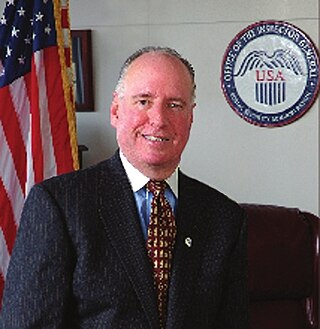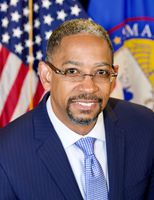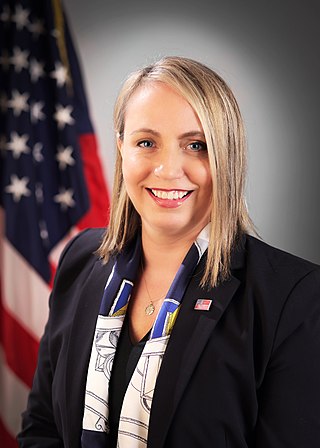In the United States, Office of Inspector General (OIG) is a generic term for the oversight division of a federal or state agency aimed at preventing inefficient or unlawful operations within their parent agency. Such offices are attached to many federal executive departments, independent federal agencies, as well as state and local governments. Each office includes an inspector general and employees charged with identifying, auditing, and investigating fraud, waste, abuse, embezzlement and mismanagement of any kind within the executive department.

Stuart W. Bowen Jr., is an American lawyer who served as the Special Inspector General for Iraq Reconstruction (SIGIR) from October 2004 to October 2013. He previously served as the Inspector General for the Coalition Provisional Authority (CPA-IG), a position to which he was appointed in January 2004. Mr. Bowen's mission includes ensuring effective oversight of the $63 billion appropriated for Iraq's relief and reconstruction.

The Office of Inspector General for the Department of State (OIG) is an independent office within the U.S. Department of State with a primary responsibility to prevent and detect waste, fraud, abuse, and mismanagement. OIG inspects more than 270 embassies, diplomatic posts, and international broadcasting installations throughout the world to determine whether policy goals are being achieved and whether the interests of the United States are being represented and advanced effectively.

The Office of the Inspector General (OIG) for the Department of Justice (DOJ) is responsible for conducting nearly all of the investigations of DOJ employees and programs. The office has several hundred employees, reporting to the Inspector General. Michael E. Horowitz has held the post since 2012.

State auditors are fiscal officers lodged in the executive or legislative branches of U.S. state governments who serve as external auditors, financial controllers, bookkeepers, or inspectors general of public funds. The office of state auditor may be a creature of the state constitution or one created by statutory law.
Elizabeth A. Coleman was appointed Inspector General for the Federal Reserve System on May 6, 2007. As Inspector General she leads the Office of Inspector General (OIG), responsible for promoting economy, efficiency, and effectiveness within the FED Board programs and operations. The responsibilities of the OIG also include the prevention and detection of waste, fraud, and abuse at the Board of Governors of the Federal Reserve System. The OIG is supposed to achieve its mandate through audits, evaluations, investigations, legislative reviews, while keeping the Chairman of the Board and Congress fully informed.

The Department of Defense Office of Inspector General is an independent, objective agency that provides oversight related to the programs and operations of the United States Department of Defense (DoD). DoD IG was created in 1982 as an amendment to the Inspector General Act of 1978.

The Office of Inspector General (OIG) for the United States Department of Health and Human Services (HHS) is responsible for oversight of the United States Department of Health and Human Service's approximately $2.4 trillion portfolio of programs. Approximately 1,650 auditors, investigators, and evaluators, supplemented by staff with expertise in law, technology, cybersecurity, data analytics, statistics, medicine, economics, health policy, and management and administration. Based on Federal Employee Viewpoint Survey scores, OIG has been ranked the best place to work (number 1) in HHS for 5 consecutive years by the Partnership for Public Service.

Daniel Ronald Levinson is an American attorney who served as Inspector General for the U.S. Department of Health and Human Services (HHS) from September 8, 2004, to May 31, 2019. HHS is among the largest departments in the federal government, encompassing Medicare, Medicaid, public health, medical research, food and drug safety, welfare, child and family services, disease prevention, Indian health, and mental health services. It also exercises leadership responsibilities in public health emergency preparedness and combating bio-terrorism.

Patrick P. O'Carroll Jr. was the third Inspector General for the Social Security Administration of the United States of America, serving from November 24, 2004, to May 31, 2016.

Gerald Walpin was an American lawyer and author. He served as the Inspector General of the Corporation for National and Community Service (CNCS) from January 2007 until June 2009, when he was removed by U.S. President Barack Obama.

The Special Inspector General for Afghanistan Reconstruction (SIGAR) is the U.S. government's leading oversight authority on Afghanistan reconstruction. Congress created the Office of the Special Inspector General for Afghanistan Reconstruction to provide independent and objective oversight of the Afghanistan Reconstruction funds. Under the authority of Section 1229 of the National Defense Authorization Act for Fiscal Year 2008, SIGAR conducts audit, inspections, and investigations to promote efficiency and effectiveness of reconstruction programs, and to detect and prevent waste, fraud, and abuse of taxpayer dollars. SIGAR also has a hotline that allows individuals to report suspected fraud.

Gordon S. Heddell (born August 13, 1943, in St Louis) is a former Inspector General (IG) of the United States Department of Defense. Previously, Heddell also served as Inspector General for the Department of Labor.

The Inspector General Act of 1978 is a United States federal law defining a standard set of Inspector General offices across several specified departments of the U.S. federal government.
The Pandemic Response Accountability Committee (PRAC) is an independent oversight committee within the Council of the Inspectors General on Integrity and Efficiency, created by the Coronavirus Aid, Relief, and Economic Security (CARES) Act of 2020 to ensure that the $2.2 trillion of the CARES act, plus 5 other pandemic-related pieces of legislation totaling over $5 trillion in government funds, were not misspent.

Paul K. Martin is an American lawyer and the Inspector General of the National Aeronautics and Space Administration. He was confirmed by the U.S. Senate on November 20, 2009. He was also appointed the Vice Chair of the Pandemic Response Accountability Committee on April 1, 2020 by Council of the Inspectors General on Integrity and Efficiency Chair Michael E. Horowitz, per the provisions of the Coronavirus Aid, Relief, and Economic Security (CARES) Act.

Hannibal "Mike" Ware is the inspector general of the United States Small Business Administration. Ware was sworn into office on May 24, 2018.

Christi A. Grimm is an American government official who has served as the Inspector General in the United States Department of Health and Human Services since February 2022.
Robert A. (Bob) Westbrooks is an American attorney and former government executive, certified public accountant, auditor, federal agent, government watchdog, speaker and author. Westbrooks is best known for his work as an inspector general and for the transparency he provided to the American public as executive director of the Pandemic Response Accountability Committee (PRAC), an independent committee within the Council of the Inspectors General on Integrity and Efficiency (CIGIE).














